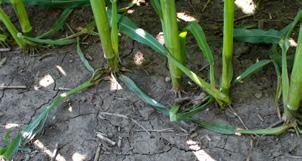
3 minute read
Tri States Grain Conditioning
Scientist, philosopher, consultant and farmer Dennis Von Arb can quickly recall 50-year-old lessons from his agronomy and entomology professors at Iowa State or tell you what the weather and crop conditions are in Argentina today. Getting high-speed internet to the farm was like getting a two-inch rain after four months of drought: Just as the soil soaks up the downpour of moisture, Dennis’ brain soaks up crop research or conditions and weather information as fast as the high-speed internet can deliver it.
Dennis and Anne Von Arb farm south of Alton. The couple has been married for 43 years and have four daughters and six grandchildren. Anne grew up on a farm northeast of Remsen and has worked for 23 years at Diamond Vogel in Orange City, where she is in charge of payroll. Dennis grew up farming in the Alton area. On top of farming full-time, he and Verlyn Sneller own the companies Nutritional Ag and SRV. He also has an active business relationship with NuForce Water Technologies LLC. To know Dennis Von Arb is to become acquainted with an evangelist for the benefits of micronutrients as a vital factor in good soil health and the benefits it will deliver in yields and more productive and healthier livestock. SRV sells a product called ACPucks which, in confinement manure pits or lagoons, helps capture the power of nitrogen, delivering up to 40 units of N more per acre of manure. ACPucks also help control other gasses and crusting in pits or lagoons. “If you can get more value out of your manure, that provides a cheaper input in crop production. It costs the same amount of money to haul a good manure sample out of there versus a manure that has ‘gassed off’ the nutrients like ammonia and hydrogen sulfide. Put that all back onto the field,” Dennis said. Ammonia advances corrosion on the steel in hog buildings quickly. Hydrogen sulfide is an acid too, as well as a source of sulfur. “If you can keep that in the pit or lagoon, you’re utilizing that for crop production instead of destroying the building.” In addition to capturing the maximum benefit from northwest Iowa’s manure resources, he’s also identified that the standard approach of applying more nitrogen, phosphorus and potassium is a shortcut which will be self-defeating if farmers don’t consider the bigger picture of soil health. “When I was a young farmer, the shotgun approach of ‘make sure you have enough of everything’ worked. But I can remember a lab at Iowa State where one of my agronomy professors made it quite clear that ‘We will be measuring out our nutrients in a teaspoon.’ One of the students asked ‘Why a teaspoon?’; and he replied ‘It doesn’t take that much to raise a crop if you have the right amounts and balance.’” Back in the 1970s, his professor said using excess amounts of N, P and K was not the best answer in the long-term. In the years to come, he predicted farmers would be paying a lot more attention to their micronutrient management, not the N, P and K.
Advertisement
Von Arb is experimenting with corn planting depth. He's demonstrating that brace roots work more efficiently in the ground. In the days of Age Media Qtr Page Color 1-8-20.pdf 1 1/8/2020 11:21:34 AM cultivating, soil was pushed up over the brace roots. Today, greater planting depth is needed to get the roots underground where they'll have a better chance to put more hair roots out.







